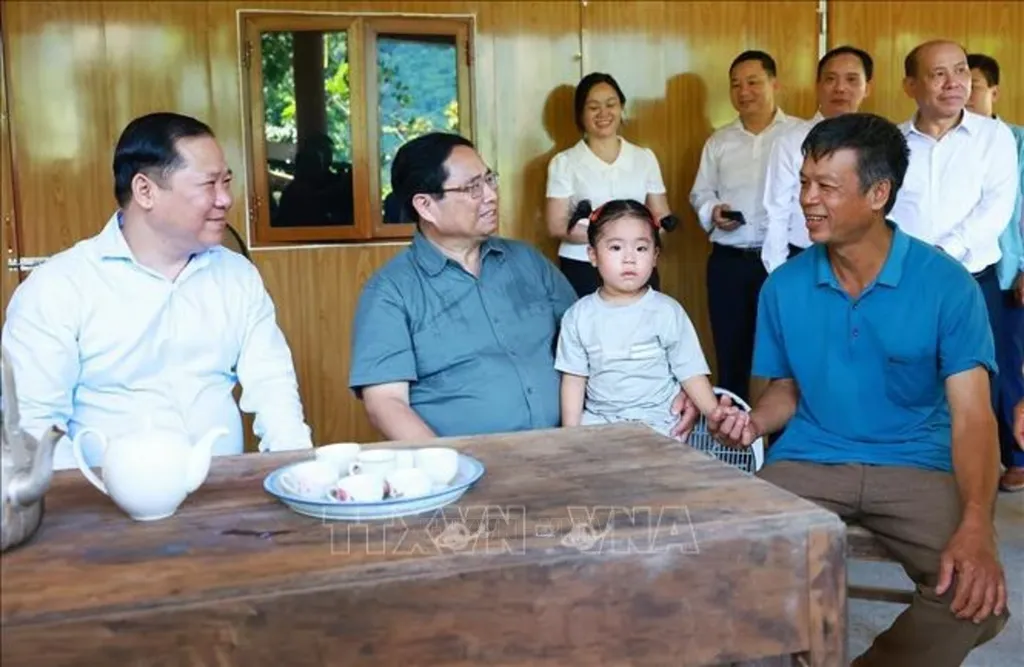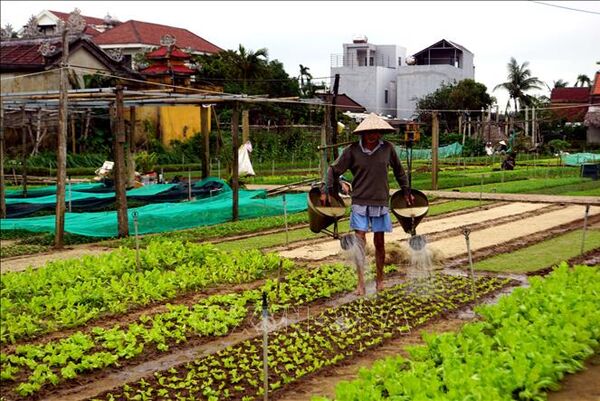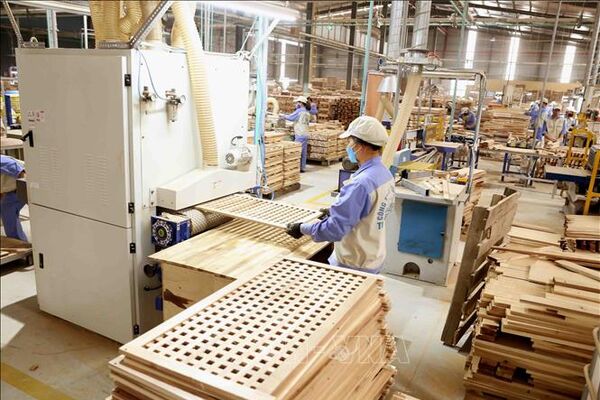 |
| Prime Minister Pham Minh Chinh (second, left) visits a family benefited from the movement to build and repair houses for the needy in Hien Luong commune in Da Bac district of Hoa Binh province. (Photo: VNA) |
Hanoi (VNA) – Replacing temporary and dilapidated houses with safe and sturdy ones is a meaningful and practical policy to help poor people enjoy better living conditions, showing the efforts by the whole political system in ensuring social welfare and leaving no one behind.
“Settling down and making a living” has been a dream of many people, especially poor and near-poor families as well as those in natural disaster-prone, far-flung and mountainous areas. However, it remains a distant dream for most of them.
Data from the Ministry of Labour, Invalids and Social Affairs reveal that currently, there are more than 153,000 temporary and dilapidated houses in need of rebuilding or repairing. In order to fund the construction of each new house with 50 million VND (2,000 USD) and the upgrading of each dilapidated house with 25 million VND, the country will need a total amount of 6.5 trillion VND, the ministry said.
Over the past decades, with the determination of the entire political system, many policies on housing support, especially for poor households across the country, have been implemented. Thanks to fundings from the State budget, the community, businesses, organisations, and individuals, many houses across the country have been built or upgraded, easing the urgent housing needs.
From 2000 to 2023, more than 1.7 million houses were built and repaired for poor people and those with disadvantaged backgrounds, encouraging them to rise and get rid of poverty, and settle down.
Building and repairing houses for the needy is one of the major policies of the Party and State, which has been considered a regular political tasks drastically and comprehensively performed by the whole political system from Party Committees, administrations, and the Vietnam Fatherland Front Committees at all levels to collectives, organisations, businesses, and individuals.
Many practical actions with high determination have been carried out to ensure that the poor access safe, solid houses, thereby creating good conditions for them to escape poverty.
This is also one of the large-scale social welfare programmes with great humanitarian meaning, demonstrating the superiority of the socialist regime, the spirit of mutual support, the aspiration to ease difficulties of other people, and sympathy for other people’s disadvantages.
As part of the efforts to promote the policy, on November 24, 2023, the 13th Party Central Committee issued Resolution No. 42-NQ/TW on continuing to renovate and improve the quality of social welfare policies, meeting the requirement of the cause of defence and construction of the Fatherland in the new period, which sets the goal of "completely eliminating the situation of temporary and dilapidated houses for poor households, near-poor households, and people affected by natural disasters and climate change" by 2030.
On April 14, 2024, Prime Minister Pham Minh Chinh, Chairman of the Central Council for Emulation and Commendation, launched an emulation movement calling on the whole nation to join hands to do away with temporary and dilapidated houses by 2025. The Government leader requested the administrations at all levels, sectors, localities, agencies, people, and businesses across the country to promote their activeness, creativeness, and responsibility towards the community and society, especially the poor, striving to complete the task.
At a meeting between Cabinet members and the VFF, ministries, and agencies on October 1 on providing support to poor and near-poor households to build and repair house, the PM asked for the implementation of a 450-day peak emulation movement, mobilising the synergy of the whole society for the work nationwide.
Particularly, he requested ministries, sectors, and localities to show high determination, great efforts, drastic actions, and thorough implementation of tasks, with a clear assignment of jobs and responsibility to particular persons, ensuring that the campaign is implemented extensively, widely, and substantively. The receiving of donations must be closely managed with strengthened supervision and examination, he said.
The policy has received strong response and support from the public. However, in order the effectively realise the movement, stronger engagement of all stakeholders is needed to spread good deeds, turning little contributions into large ones, thereby helping the needy to live in stable and safe houses, extending to them a helping hand to not only get out of poverty but also gradually improve their living standards, contributing to sustainable poverty reduction./.









